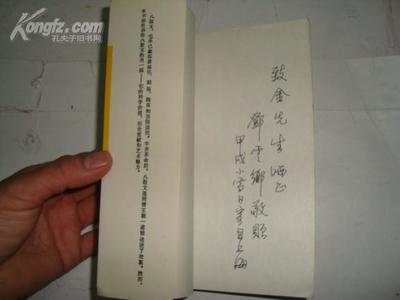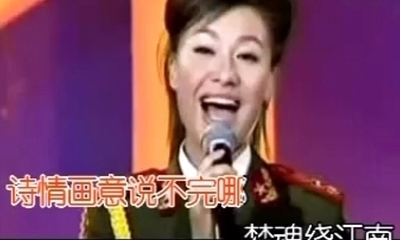
古文奇才王云飞最近参加高考。这是他以文言文写的考试文章。改卷老师看不懂,请教古文专家。专家说有至少40-50字没见过,花了数天查字典,写下四页长的评语。以下是王云飞的原文和译文,以及我的英文翻译。希望您喜欢。也希望您对文言文会重燃新的喜爱。
This high-school kid, Wang Yunfei王云飞, from China, recently wrote an article about theenvironment in classical Chinese 文言文for his university entranceexam. He is in Senior Middle 3, about 18 yearsold.
The teacher marking the paper could not make out what hewrote, so he handed it to an expert on Classical Chinese. Theexpert admitted not to know up to 40-50 characters in the paper. Hespent the next few days looking up dictionaries and books and cameout with a 4-page commentary.
The article hit cyberspace like a bolt of lightning. It hasopened people's eyes to the intricacy and subtlety of classicalChinese. I translated it into English based on Wang's ownexplanation. From the point of view of thesubject matter, it's fascinating. I hope you enjoy it and for thosewho read Chinese, this may rekindle your interest in classicalChinese.
王雲飛高考作文原文:《綠色生活》
呱呱小儿,但饮牛湩[dòng],至于弱冠,不明犍[jiān]状。佌佌[cǐ]之豚,日食其羓[bā]。洎[jì]其成立,未识豜豭[jiānjiā]。每啮毚臑[nièchánnào],然竟不知其夋[jùn]兔之三窟也。方彼之时,窋[zhú]咤之态,非闤闠[huánhuì]之中所得见也。
今北方久熰[ōu],瀵氿甃眢[fènguǐzhòuyuān],坌[bèn][ài]坲坲[fó],燾[tāo]天幠[hū]日。土地皴[cūn]崩,罅[xià]可容人。南疆霶霈[pángpèi],洚水肆虐,当此之滈[hào],茅舍尽走。欲苫[shān]不能,啼泣啾啾[jiū]。
凡此异态,非天之咎。
君不见斵[zhuó]楩[pián]焚樟,岵[hù]之为屺[qǐ],睇眄[miàn]之下,万山尽屼[wù],百尺篔[yún]簹[dāng],化为竹箸。于彼幼蛇,匌[gé]不盈寸,巴蛇王虺[huǐ],尽化柈[pán]饈。玈[lú]气烰烰[fú],上格瑶池,贫地徠[lái]贾,以丰其貲[zī]。然千丈方圆,萊[lái]菔[fú]不生,九天之上,星河不见。
呜呼!漫山设棙[lì],遍地尽罘[fú]。此天灾也?人祸也!河海黟[yī]然,浊水仍倾,此天灾也?人祸也!斵[zhuó]木 [cuì]竹,彍[kuò]弮[quān]待兽,以至鹿不得走,翬[huī]不得飞,蚁不得宭[qún],髬[pī]髵[ér]不见。此天灾也?人祸也!
翕[xī]合沴[lì]气,终日涽[hūn]涽。天不复蓝,水不复清。未有乌云,天何暝暝?赤鸟既出,焜[hǔn]耀无复。看天下,鸟飞不下,鮮鲜狉狉,当此之时,何处貣[tè]青天?
所幸者,人知之也,人更之也。然,上作纲法,下偩[fù]几何未可知也。
今天下多灾。北国井冞[mí],陈主复至,当与孔张俱歾[mò]。南域之霖,大禹洊[jiàn]存,只得扼腕而叹息。人不咎己而咎旱魃[bá],不诮[qiào]己而诼[zhuó]共工。未之可也。闤闠所趋,不可恈[móu]恈。当思子孙后代,人己知之。然行之效,则体躆朝堂者思之,媕娿[ānē]之徒,弃不婟[hù]嫪[lào],国之大蠹,捐而必究。
吾所思者,河泮水墺[ào],杨槐蓁[zhēn]蓁,町[tīng]疃[tuǎn],柳榆其秝[lì]。苾[bì]葌[jiān]柅[nǐ]柅,游屮[chè]葳[wēi]蕤[ruí],见柳而人不攦[lì],视草而众不蹸[lìn],日驾双軑[dài]之车,斐斐闾巷之間,目不復睺[hóu],鼻不再鼽[qiú],鸟不惊人,鮒[fù]游淰[shěn]然。
人者,天地孕育。今其反万物,此獍[jìng]也。今其不宜瞡[guī]瞡,遗祸孥[nú]孙,当修长远之道以藾万世。
今吾执聿于此,所思者,舍旁早蟠一株,今当唪唪[fěng],攲[qī]枝水上,当复驾舴艋, [qū]其落桃,投于苙[lì]。坐银杏树下,觀兒童嬉於树下, [chān]于砖祴[jiē],搤[è]腕而惜水中未置菱藕几株。燠[yù]热之时,而可摘菱冣[jù]菂[dì],爇[rùo]之为饘[zhān],以奉亲房。
王云飞自译文:
呱呱坠地的小孩,只知道喝牛奶;到二十岁,还不知道牛的样子。幼小的猪,(小孩)每天都吃它的肉;等到成年,也不能分辨猪的公母。人们常常啃吃野兔的兔腿,然而最终却不知道狡兔有三窟。在那个时候,兔子从洞穴里出来的神态,不是街市之中能够看见的。
现今北方久旱,泉涸井枯,尘埃飘拂,遮天蔽日。土地干裂,缝隙大可容人。南疆大雨滂沱,洪水肆虐。遇到这样的水灾,草舍都被冲走。想修缮而不能,人们只能啾啾地啼哭。
凡是这样的异象,并非上天的罪过。
你难道看不见砍伐树木焚毁森林,草木葱郁的山变得荒芜。极目远望,万山都光秃秃的。百尺高的竹子,都做成了竹筷子。对于那些小蛇,粗不足一寸,(与)剧毒蛇王,都成为盘中美味。工厂黑色的废气蒸腾上升,上达瑶池。贫穷之地招徕商贾,以增加他们的财富。然而方圆千丈之内,连萝卜都不能生长,九天之上,星河也不能看见。
哎!人们漫山遍野地设下捕兽的机关和抓兔子的网。这是天灾吗?是人祸啊!河海里的水已变得漆黑,各种废水还在不断向其中排放。这是天灾吗?是人祸啊!砍木伐竹,张弓等兽,以至鹿不能奔跑,鸟不能自由飞翔,蚂蚁不能群居,野兽鬃毛竖起也不能看见。这是天灾吗?是人祸啊!
人们呼吸着浊气,整天昏昏沉沉。天不再蓝,水不再清澈。没有乌云,天空为何阴沉?旭日升起,太阳光彩明亮的样子也不复存在。看人间,鸟飞而不敢落下,很少能看见野兽成群奔跑,在这样的时候,到哪里去能乞求到青天?
庆幸的是人知道这种灾难,人能够改变这样的状况。然而,国家制定法令,民众有几个能遵守执行,就无法知道了。现
在天下多灾多难。北国井枯,(即使)陈后主再次到来,(也只)当与姓孔与姓张的两个妃子一齐死在井底;南疆大水,(即使)大禹还活着,(也)只能扼腕叹息。人们不归罪于自己而归罪于造成旱灾的鬼怪,不责备自己却责备共工。不可这样做啊!城市的发展不能急功近利,应当考虑到子孙后代。人们已经知道后果的严重性。然而力行改变,则是那些当权者要思考的。阿谀奉承的小人,舍弃而不要怜惜;国家的蛀虫,舍弃而必定要追究。
我所梦想的是,河流边上,杨槐青翠丛杂,舍边空地上,柳树榆树稀疏而均匀地排列着。芳香的兰花和野草长得十分茂盛。看见柳枝,但人们不去折断它;看到草坪,但众人不去践踏。在街巷之间徘徊散步,眼睛不再迷茫,鼻子不再堵塞,鸟悠适而不怕人,鲫鱼偶尔被水边的动静惊走。
人是天地所生。现在反而残害万物,这(如同)是生下来就吃母亲的野兽。现在不应当目光短浅,遗祸子孙。应当作长远之计来福荫万代。
今天我执笔于此,所想的是,屋旁长有早蟠桃一株,如今应果实累累。桃树的枝丫斜伸向水面,我想再驾小舟,拾起它落入水中的桃子,扔进猪圈。坐在银杏树下,观看儿童在树下嬉戏,在砖铺的小道上闲适地散步。扼腕叹惜水中没有种植菱藕几株。夏天炎热的时候,就可以摘菱聚莲,烧煮成粘稠的粥,侍奉亲长。
GreenLiving
(Translated by Teng Ooi based on the author's explanatory notes 黄定茂译)
New-born babies know only to drink cow’s milk. Whenthey reach age twenty, they know not how a cow looks. Children feedon piglet’s flesh daily; when they grow up, they can’t tell thepig’s gender. People often eat rabbit thighs; yet they do not knowthe crafty rabbit has three caves. The spectacle of the rabbitcoming out of its cave is not to be found in thestreets.
Now the North is having a prolonged drought. Thespring is arid, the well dry. Dust scatters everywhere, coveringthe sky and blocking the sun. The land is cracked; the gap is bigenough to contain a person. In the Southern borders, heavy rainleads to ravaging floods, destroying wooden huts which areirreparable. The people can only weep inconsolably.
All these strange phenomena are not the fault ofHeaven.
Can’t you see the trees are being felled and forestsburned? The hills covered with vegetation become barren. From farthey look bald. Hundred-foot tall bamboo trees are turned intochopsticks. Small snakes, hardly an inch thick, along with the mostvenomous ones, end up as prized delicacies. Black plumes rise fromfactory tops, reaching high heaven. Businessmen are drawn to sparselands, to enhance their profit. But in the sphere of a thousandzhangs (10 Chinese feet), carrots will not grow, and in the sky,the stars cannot be seen.
Alas, everywhere traps for animals are set. Are thesenatural disasters? No, they are man’s misadventures. The water inthe rivers and seas has turned pitch-black, yet putrid waste waterkeeps emptying into them. Are these plagues sent from Heaven? No,these are man-made accidents. Cutting down trees and bamboos,laying traps for animals, until the deer cannot escape, the birdscannot fly freely, the ants lose their communal nests, the animalscannot see even with their mane raised. Are these naturaldisasters? These are human follies.
People breathe in foul air; all day long they aretired and gloomy. The sky is no longer blue, the water no longerclear. There are no dark clouds, why then is the sky overcast? Therising sun shines forth no more. Look at the earth: the birds areafraid to land; rarely do animals roam the ground. At a time likethis, where can we go in search of clear sky?
Fortunately, people know the reasons behind suchdisasters and are able to change them. But how many will abide bythe rules set by the government? There is no way toknow.
The world is full of disasters today. In the North thewells are dry. If Emperor Chen Hou Zhu陈后主 were to be here, he would still perish in the welltogether with his concubines Kong孔貴嬪 and Zhang 張麗華. Floods ravage the South; if Da Yu大禹 were still alive, he might just wring his hands andsigh. People don’t blame themselves but blame the demons forcausing the droughts. They spare the blame for themselves but blamethe Water deity Gong Gong 共工氏. This is not the way to do things! Urban developmentshould not be too rush and profit-centered. We should think of ourdescendants. Everyone should realize the severity of theconsequences. The real efforts to change should come from those whowield power. Get rid of the sycophants without pity. Investigatethe profiteers without delay.
I dream that on the river banks, the poplarsand acacia trees are lush and green; in the courtyardsnext to the houses, willows and elms are sparse but neatly lined.The fragrant orchids and wild grass are luxuriant. People seewillow trees but do not snap their branches; they come upon thegrasses but do not trample on them. As we take a stroll around thestreets and alleys, our eyes are no longer misty, the nose nolonger blocked. The birds do not fear people and the carpsoccasionally swim away when startled by movements near thewater.
Humans are born and nurtured by Heaven and Earth, yetwe now destroy all living things. This is like wild animalsdevouring their own mothers. We must not be short-sighted and ruinour progeny. We must make long-term plans for the sake of futuregenerations.
As I am writing, I think about a peach tree laden withfruits. A branch stretches low into the water. I wish to ride asmall boat, picking the fruits and throwing them toward the pigs'ring. Sitting beneath the gingko tree, l watch children frolickingin the shade or walking leisurely on a path of paved bricks. Iregret not planting a few chestnut and lotus plants. In the hotsummer, I could pluck a few chestnut and lotus seeds, cook themuntil they become gooey porridge and serve them to my elders.
 爱华网
爱华网


